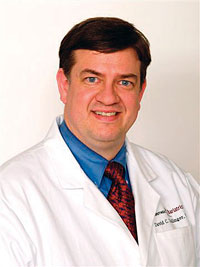David Voellinger, M.D.
By Laura Freeman
 |
David Voellinger |
David Voellinger has always enjoyed exploring the horizons of health care—and understanding how new technologies can help improve patients’ lives. That drive led him to the field of bariatric surgery, where he has become a pioneer in the application of groundbreaking techniques and treatments to help patients face the physical and psychological challenges of obesity.
Recently Voellinger performed the fourth incisionless bariatric surgery in the United States on a 39-year-old patient at Presbyterian Hospital in Charlotte, North Carolina. “The POSE (primary obesity surgery, endolumenal) procedure was part of the research to evaluate a new endoscopic surgery tool—the EndoSurgical Operating System (EOS)—to visualize the stomach,” he says.
“Working through the patient’s mouth, I use the EOS tool to grasp the stomach lining. Then I deploy polyester suture anchors to hold the tissue in place while creating multiple tissue folds on the stomach wall to reduce the stomach’s size and capacity,” he explains. “Eliminating incisions reduces the risk of infection, scars are completely eliminated, and there’s less postoperative pain and faster recovery.
“This may change the way bariatric surgery is done,” Voellinger says. “It helps patients control hunger, and they are back to normal activity in a few days.”
Voellinger had previously used the EOS tool, manufactured by USGI Medical, for revising bariatric surgeries. He says the technology also has been adapted for other new procedures including transoral gallbladder removal and transvaginal appendectomies.
Exploring the Field
The Dothan, Alabama, native became interested in bariatric, laparoscopic, and endoscopic procedures as an SOM medical student and resident. “What drew me to bariatric surgery was seeing our patients there postoperatively—and how the procedures had changed their entire lives by helping them control hunger to lose weight,” he recalls. “Many of their medical problems were gone, they were off medications, they were more confident, and they had a better outlook on life.”
After graduation in 1994 and completion of his residency in 1996, Voellinger ventured further into the field with a fellowship in advanced laproscopy and bariatrics at New York’s Mount Sinai Medical Center. Five years ago he founded Southeast Bariatrics in Charlotte, but he hasn’t forgotten what he learned in Birmingham.
“I had some terrific teachers,” Voellinger says. “The school gave me a wide breadth of knowledge. I’m still involved in clinical research because of the work I did there. Currently, I’m involved with a national study on a new gastric band and two studies on endoscopic techniques.”
Voellinger says that he still applies the lessons of his SOM mentors. “It all boils down to taking care of patients and what happens in the operating room,” he says. “It’s more than just the surgery itself. It’s how you set up the room and the team and how you care for the patient and family.”
A Good Match
One crucial aspect of that care, Voellinger says, is matching the patient to the bariatric procedure. “There are pluses and minuses to each,” he explains. “An adjustable band has lower risks, but there is typically less weight loss. With a gastric bypass or a biliopancreatic diversion with duodenal switch, patients lose the most weight but risks are higher. A vertical-sleeve gastrectomy is in between.
“As we get five-, 10-, and 20-year data on bariatric surgery, the techniques are getting better. We’ve decreased morbidity and mortality to less than 1 percent. Around 80 to 90 percent of patients lose significant weight and keep it off with appropriate surgery and lifestyle management.”
Voellinger emphasizes that bariatric surgery is a tool—not the whole treatment. “Patients should be carefully selected and educated prior to surgery. They need lifestyle management and follow-up for success,” he says, adding that his staff includes a nutritionist, physiologist, behavior counselors, and even some former patients.
Looking ahead, Voellinger plans to continue making his practice an innovative, multidisciplinary resource that can provide tools to help patients win the obesity battle. “With the improvements we’re making, I hope we’ll soon have more to offer adolescents, patients with diabetes, and others who need help avoiding the serious physical and emotional consequences of obesity,” he says. “I love being out there, pushing the envelope every day.”